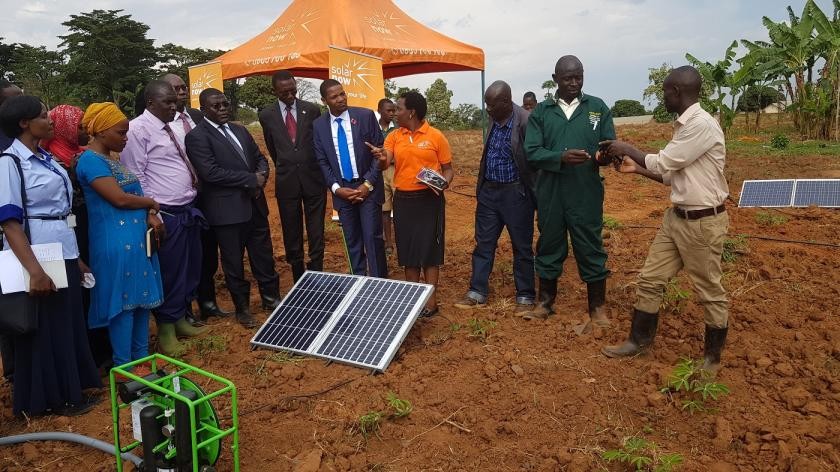|
Getting your Trinity Audio player ready…
|
By Dr. Richard Munang
The world is on a red alert, and the planetary emergencies are getting worse. #climateChange, #biodiversity loss and #pollution and #waste are weighing down on us.
# Africa’s contribution to the #climate stability of the world needs to be fronted. We must change the narrative from #Africa being victims of #climatechange requiring help to Africa alone to now front the truth, which is that #Africa is a #climateaction and #mitigation champion.
You don’t win on defence and projecting weaknesses. You win on offence and projecting value and leverage. Having the youngest and fastest growing population on earth, we have enormous untapped opportunities to place Africa firmly at the table of the #climate debate.
Nowhere on the planet is feeling climate change’s effects more than in Africa, and nowhere are the solutions to #climateaction more viable than in #Africa. According to recent research, the upsurge in droughts, floods, heatwaves, and other climate-related events is reducing the continent’s economic growth by 5% to 15% per year. In simple terms, this is to say that the productive output of each African is reduced by 5 – 15% every year because of climate change and is reflected in declines in food systems, damaged infrastructure, increased prevalence of diseases, lost biodiversity, which affects vital income sectors like tourism, among others.
And all this is in a region that holds up to 17% of the global population yet accounts for a negligible 3% of cumulative global historical CO2 emissions, the least of any region. This makes the continent not only the most miniature emitter but a net-positive continent, whose net positivity contributes significantly to stabilizing the global climate.
For example, the African rainforests are famed for being the world’s best carbon sponges. The Congo Basin rainforest offsets more than the whole African continent’s annual emissions.
In addition, Africa’s average emissions per person are only 0.8 tonnes of CO2 per person per year, compared to the global average of 4.8 tonnes.
In the future, Africa will gain immensely by pursuing pathways that maintain its status as a low-carbon emitter. For example, it is estimated that new business opportunities in sustainable food and land use systems could deliver up to $320 billion annually by 2030 across sub-Saharan Africa. These include $120 billion in forest ecosystem services and restoration of degraded land, $100 billion in increased agricultural yields, and $100 billion in supply chain efficiency improvements and enhanced value-adding capacity, with clean energy prioritized to power these value-added activities. In addition, low-carbon manufacturing can generate $200million – $2 billion in yearly revenue by 2030 while creating up to 3.8million jobs over the next 30 years.
The moral imperative to support African nations in adapting their economies to a climate-affected future is only too apparent. Yet, an “us and them” framing of the climate debate is a road to nowhere – or, instead, a road to almost certain climate disaster and ever greater humanitarian misery. Only by reframing the narrative around #climateaction as an investment opportunity do we stand a hope of averting climate catastrophe. As citizens of Africa, we have been conditioned to believe we are helpless in a global world, whereas we have the solutions to the world. It is time to take back control, write the narrative and be the masters of our destiny.
We must develop a narrative that attracts people to want to engage us on #climateaction on a win-win basis. With this outcome in mind, our narrative should include three elements.
Firstly, supporting the translation of NDCs into investments. It is estimated that up to 72% of African NDCs lack investment plans, which are critical to converting these plans into investments capable of attracting implementation resources from diverse economic players – state, non-state, formal, informal, individual, and institutional. Our UN Environment Programme #NDC Action project supports countries in translating their NDCs into implementation investments. They are founded on balancing mitigation and adaptation principles, building on ongoing actions in countries for confluence, and aligning with country priorities.
Secondly, pushing blended finance. Africa’s NDCs financing gap of at least $3trillion, nearly equivalent to the continent’s GDP, cannot be practically bridged through public finance alone. We are supporting countries to establish low-risk financing facilities aimed at unlocking the power of market financing to drive investments in the chosen NDC areas. Two broad formations are taking shape-de-risking financing for capital-intensive interventions and de-risking financing for non-capital-intensive interventions.
The third is #youth #skillsretooling for climate action from an enterprise lens. The #youth are # Africa’s powerhouse and, together with the #informalsector, form the most critical constituency of implementers. Tapping into the ingenuity and creativity of youth leveraging the spirit of #innovativevolunteerism has fostered symbiotic collaborations with the informal sector in driving the uptake of #climateaction solutions.
Africa’s starting point is developing a new, bold narrative. The UN Environment Programme is already playing an essential role as the environmental thought leadership convenor that brings the science-policy linkages that inform stakeholders on the opportunities that can be tapped within #climateaction and a coherent narrative that accurately depicts Africa as it exists right now.
